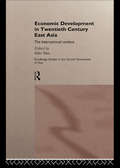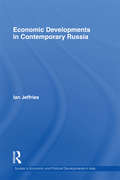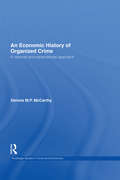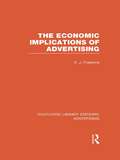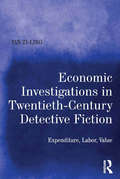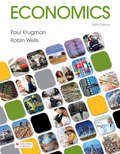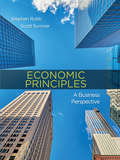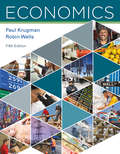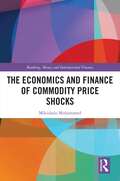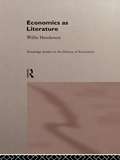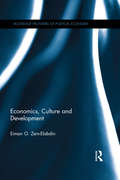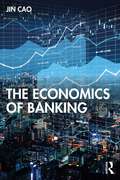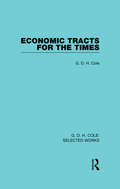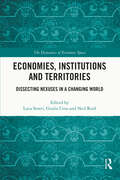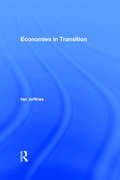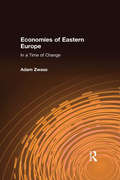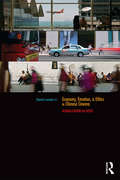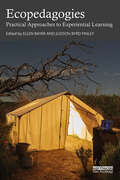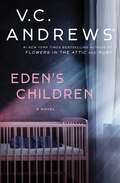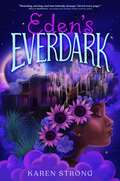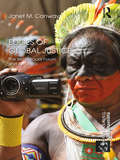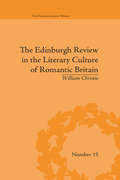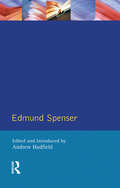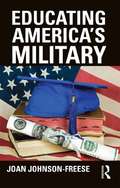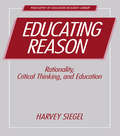Special Collections
Benetech’s Global Certified Accessible Titles
Description: Benetech’s GCA program is the first independent third-party EPUB certification to verify ebook accessibility. By creating content that is born accessible, publishers can meet the needs of all readers. Learn more: https://bornaccessible.benetech.org/
- Table View
- List View
Economic Development in Twentieth-Century East Asia
by Aiko IkeoThis collection supplies fascinating insights into aspects of East Asian economic development. It will interest scholars in a variety of related fields and provoke further research and debate.
Economic Developments in Contemporary Russia
by Ian JeffriesThis book provides a comprehensive overview of Russia’s difficult economic transition from a command economy since the early 1990s. It covers the financial crisis of August 1998 and the global financial crisis a decade later. Key subjects covered include economic transition, privatization and liberalization; changes in land ownership and agriculture; energy; foreign direct investment; economic stabilization; and economic performance. Russia is well endowed with raw materials, especially oil and natural gas; this book argues that in some ways this has not helped Russia’s attempts to become a more diversified and high-tech economy. Overall, the book demonstrates how much the Russian economy has changed in the period. It continues - and adds to – the overview of developments in the author’s The New Russia (2002), and is the companion volume to Political Developments in Contemporary Russia (2011) - both published by Routledge.
An Economic History of Organized Crime
by Dennis M. McCarthyThis book is a comparative study of organized crime groups from five different parts of the world: Europe; North America; Central America/South America/Caribbean basin; Africa; and Asia/Western Pacific. Each part contains two case studies and a shorter essay, a vignette. From Europe the case studies focus on the Italian mafias and the Russian mafia; the vignette, on the Albanian mafia. From North America the case studies highlight the US Mafia and the Mexican drug cartels; the vignette, organized crime in Canada. From Central America/South America/Caribbean basin the case studies concentrate on the Colombian drug cartels and gangs of the Caribbean; the vignette, on organized crime in Cuba. From Africa the case studies examine resource wars and Somali piracy; the vignette, relations among international drugs trafficking, organized crime, and terrorism in North and West Africa. And from Asia/Western Pacific the case studies spotlight the Chinese Triads and Japanese Yakuza; the vignette, relations among international drugs trafficking, organized crime, and terrorism in Afghanistan. Written in non-specialist language, An Economic History of Organized Crime provides an original overview of a crucial problem of our times: the growing scourge of global organized crime. This book can be read with profit by the general public, but it also has value for academic specialists and professionals in law enforcement.
The Economic Implications of Advertising
by Otto John FirestoneIs advertising a factor that contributes to rising costs and prices? This study, commissioned to answer just that question by the Institute of Canadian Advertising, examines the effect of advertising on the Canadian economy, on business, the consumer, costs and prices, productivity, competition, employment, social welfare and economic growth. The Economic Implications of Advertising provides a valuable insight into a little-studied area of advertising, and will be of great interest to students of the industry everywhere. First published in 1967.
Economic Investigations in Twentieth-Century Detective Fiction
by Yan Zi-LingIn his study of Golden Age and hard-boiled detective fiction from 1890 to 1950, Yan Zi-Ling argues that these two subgenres can be distinguished not only by theme and style, but by the way they structure knowledge, value, and productive labour. Using the detective as a reference point and enactor of socially based interests, Yan shows that Golden Age texts are distinguished by their conservationism (and not only by their conservatism), with the detectives’ actions serving to stabilize institutions with specific ideological aims. In contrast, the criminal investigations of the hard-boiled detective, who is poorly aligned with institutions and strong interest groups, reveal the fragility of the status quo in the face of escalating cycles of violence. Key to Yan’s discussion are theories of exchange, value, and the gift, the latter of which he suggests is more akin to detective work than is wage labour. Analyzing texts by a wide range of authors that includes Arthur Conan Doyle, Agatha Christie, Dashiell Hammett, Raymond Chandler, Dorothy Sayers, Raoul Whitfield, George Harmon Coxe, and Mickey Spillane, Yan demonstrates that the detective’s truth-generating function, most often characterized as a process of discovery rather than creation, is in fact crucial to the institutional and class-based interests that he or she serves.
Economics
by Paul Krugman and Robin WellsWith its signature storytelling style and coverage of current issues and events, Nobel laureate and New York Times columnist Paul Krugman and co-author, Robin Wells�s best-seller is the most effective textbook available for explaining how economic concepts play out in our world.This new edition offers incisive new insight into market power and externalities in microeconomics, updated analysis of long-run growth, and extensive coverage of the economic impacts and policy responses to the coronavirus pandemic in macroeconomics.
Economics
by Rubb SumnerEconomic Principles: A Business Perspective leverages student fascination with business by drawing clear connections between fundamental economic theory and the business decisions that students—whether they are future CEOs, small business owners, managers, or independent workers—will make in their careers.
Economics
by Paul Krugman and Robin WellsWhile we were driven to write this book by many small ideas about particular aspects of economics, we also had one big idea: an economics textbook should be built around narratives, many of them pulled from real life, and it should never lose sight of the fact that economics is, in the end, a set of stories about what people do.
Many of the stories economists tell take the form of models—for whatever else they are, economic models are stories about how the world works. But we believe that student understanding of and appreciation for models are greatly enhanced if they are presented, as much as possible, in the context of stories about the real world that both illustrate economic concepts and touch on the concerns we all face living in a world shaped by economic forces.
You’ll find a rich array of stories in every chapter, in the chapter openers, Economics in Actions, For Inquiring Minds, Global Comparisons, and Business Cases. As always, we include many new stories and update others. We also integrate an international perspective throughout, more extensively than ever before. It starts with a new introduction and an opening story on China’s Pearl River Delta that sets the stage for new attention to China’s ascendance in the global economy. An overview of the types of narrative-based features in the text is on p. viii.
We also include pedagogical features that reinforce learning. For example, each major section ends with three related elements devised with the student in mind: (1) the Economics in Actions: a real-world application to help students achieve a fuller understanding of concepts they just read about; (2) a Quick Review of key ideas in list form; and (3) Check Your Understanding self-test questions with answers at the back of the book. Our thought-provoking end-of-chapter problems are another strong feature. The Work It Out feature appears in all end-of-chapter problem sets, offering students online tutorials that guide them step-by-step through solving key problems. With the Fifth Edition, a new feature, Discovering Data exercises, offers students the opportunity to use interactive graphs to analyze interesting economic questions. An overview of the text’s tools for learning is on p. ix.
The Economics and Finance of Commodity Price Shocks
by Mikidadu MohammedThe behaviour of commodity prices never ceases to marvel economists, financial analysts, industry experts, and policymakers. Unexpected swings in commodity prices used to occur infrequently but have now become a permanent feature of global commodity markets. This book is about modelling commodity price shocks. It is intended to provide insights into the theoretical, conceptual, and empirical modelling of the underlying causes of global commodity price shocks. Three main objectives motivated the writing of this book. First, to provide a variety of modelling frameworks for documenting the frequency and intensity of commodity price shocks. Second, to evaluate existing approaches used for forecasting large movements in future commodity prices. Third, to cover a wide range and aspects of global commodities including currencies, rare-hard-lustrous transition metals, agricultural, energy, and health pandemics. Some attempts have already been made towards modelling commodity price shocks. However, most tend to narrowly focus on a subset of commodity markets, i.e., agricultural commodities market and/or energy market. In this book, the author moves the needle forward by operationalizing different models, which allow researchers to identify the underlying causes and effects of commodity price shocks. Readers also learn about different commodity price forecasting models. The author presents the topics to readers assuming less prior or specialist knowledge. Thus, the book is accessible to industry analysts, researchers, undergraduate and graduate students in economics and financial economics, academic and professional economists, investors, and financial professionals working in different sectors of the commodity markets. Another advantage of the book’s approach is that readers are not only exposed to several innovative modelling techniques to add to their modelling toolbox but are also exposed to diverse empirical applications of the techniques presented.
Economics as Literature
by William HendersonA rich vein of economics writings which runs through the nineteenth century and beyond is now largely ignored because its authors were women or because they favoured literary over scientific forms. Economics as Literature re-examines some of the most interesting texts from within this tradition.The works considered include:*stories (eg by Maria Edgeworth and Harriet Martineau)*dialogues (eg by Jane Marcet and Thomas de Quincey)*'imaginative' writing (eg from Ruskin and Francis Edgeworth)*Keynes' General Theory which is locked within a nineteenth century 'tradition' of uniting science and art.
Economics, Culture and Development
by Eiman O. Zein-ElabdinThis book examines the treatment of culture and development in the discipline of economics, thereby filling a conspicuous gap in current literature. Economics has come a long way to join the ‘cultural turn’ that has swept the humanities and social sciences in the last half century. This volume identifies some of the issues that major philosophies of economics must address to better grasp the cultural complexity of contemporary economies. This book is an extensive survey of the place of culture and development in four theoretical economic perspectives—Neoclassical, Marxian, Institutionalist, and Feminist. Organized in nine chapters with three appendices and a compendium of over 50 interpretations of culture by economists, this book covers vast grounds from classical political economy to contemporary economic thought. The literatures reviewed include original and new institutionalism, cultural economics, postmodern Marxism, economic feminism, and the current culture and development discourse on subjects such as economic growth in East Asia, businesswomen entrepreneurs in West Africa, and comparative development in different parts of Europe. Zein-Elabdin carries the project further by borrowing some of the insights from postcolonial theory to call for a more profound rethinking of the place of culture and of currently devalued cultures in economic theory. This book is of great interest for those who study Economic development, International relations, feminist economics, and Economic geography
The Economics of Banking
by Jin CaoThe Economics of Banking provides an accessible overview of banking theory and practice. It introduces readers to the building blocks of fundamental theories and provides guidance on state-of-the-art research, reflecting the dramatic changes in the banking industry and banking research over the past two decades. This textbook explores market failure and financial frictions that motivate the role of financial intermediaries, explains the microeconomic incentives and behavior of participants in banking, examines microlevel market stress caused by economic recessions and financial crises, and looks at the role of monetary authorities and banking regulators to reduce systemic fragility as well as to improve macroeconomic stability. It delivers broad coverage of both the micro and macroeconomics of banking, central banking and banking regulation, striking a fine balance between rigorous theoretical foundations, sound empirical evidence for banking theories at work, and practical knowledge for banking and policymaking in the real world. The Economics of Banking is suitable for advanced undergraduate, master’s, or early PhD students of economics and finance, and will also be valuable reading for bankers and banking regulators.
Economic Tracts for the Times
by G. D. ColeOriginally written as a series of pamphlets and at a time of high unemployment, this volume discusses free trade, monetary policy, wages and employment, economic theory and social legislation.
Economies, Institutions and Territories
by Neil Reid and Luca Storti and Giulia UrsoPresenting multidisciplinary and global insights, this book explores the nexus between economies, institutions, and territories and how global phenomena have local consequences. It examines how original and innovative economic related processes embed themselves in societies at the local level; how boundaries between the state and the market are placed under stress by unexpected changes. It explores whether new types of elites and forms of social inequalities are emerging as a result of institutional and economic changes, and whether peripheral areas are experiencing insidious forms of economic and institutional lock-in. Presenting empirical cases and useful analytical and conceptual tools, the book makes current economic and territorial phenomena more understandable. This is an important read for students and scholars in the fields of geography, sociology, political sciences, anthropology, economics, regional science, and international relations. It is also a valuable resource for policymakers, well-educated lay readers and economic, political and international relations journalists.
Economies in Transition
by Ian JeffriesThis volume provides an in-depth review of major economic developments in those economies which are in some stage of transition, following the collapse of communism in the Eastern block. The book is divided into four parts: * theoretical issues in the transition from command to market economies * the events in the fifteeen independent countries of the former Soviet Union * Eastern Europe * non-European states In all, the author chronicles events from 1993 to 1995 in thirty-five countries. Economic developments are set in their political context and presented chronologically as far as possible. A Guide to the Economies in Transition carries on where Ian Jeffries' previous book left off. The work is entirely new and, as such, can be seen as a companion to the earlier title. These books are becoming known as invaluable guides, providing unique levels of reference in work of this type.
Economies of Eastern Europe in a Time of Change
by Adam ZwassThe development and use of the atomic bombs at Hiroshima and Nagasaki number among the formative national experiences for both Japanese and Americans as well as for 20th-century Japan-US relations. This volume explores the way in which the bomb has shaped the self-image of both peoples.
Economy, Emotion, and Ethics in Chinese Cinema
by David Leiwei LiThe First and Second Comings of capitalism are conceptual shorthands used to capture the radical changes in global geopolitics from the Opium War to the end of the Cold War and beyond. Centring the role of capitalism in the Chinese everyday, the framework can be employed to comprehend contemporary Chinese culture in general and, as in this study, Chinese cinema in particular. This book investigates major Chinese-language films from mainland China, Taiwan, and Hong Kong in order to unpack a hyper-compressed capitalist modernity with distinctive Chinese characteristics. As a dialogue between the film genre as a mediation of microscopic social life, and the narrative of economic development as a macroscopic political abstraction, it engages the two otherwise remotely related worlds, illustrating how the State and the Subject are reconstituted cinematically in late capitalism. A deeply cultural, determinedly historical, and deliberately interdisciplinary study, it approaches "culture" anthropologically, as a way of life emanating from the everyday, and aesthetically, as imaginative forms and creative expressions. Economy, Emotion, and Ethics in Chinese Cinema will appeal to students and scholars of Chinese cinema, cultural studies, Asian studies, and interdisciplinary studies of politics and culture.
Ecopedagogies
by Ellen Bayer and Judson Byrd FinleyEcopedagogies showcases a range of creative approaches that educators across multiple disciplines use to empower students to access and engage with nature, an increasingly important consideration in a post-COVID world in environmental crisis. The volume includes chapters written by scholars from the environmental arts and humanities, literature, writing studies, rhetoric, music, religious studies, environmental studies and sustainability, sociology and anthropology, physical education, and outdoor education. Each author walks the reader through the details of how their ecopedagogy works, identifies potential challenges while also detailing how to address them, and explains the rewards to students, instructors, and more-than-human nature that they have witnessed through the use of these approaches. The contributions represent diverse types of academic institutions, offering broad applicability to instructors, including community colleges, private liberal arts colleges, and large state, regional, public, and private universities. The book explores a series of key questions about how educators can facilitate meaningful learning experiences with the natural world, inside and outside the classroom, and it looks at how to foster inclusivity, navigate problems with access, and explore intersections with environmental justice. As a practical guide, the book delivers a well-provisioned toolbox containing exercises, activity guides, and assignments for those teaching environmentally focused college courses.
Eden's Children
by V.C. AndrewsMother doesn&’t always know best in this atmospheric and twisty novel from the #1 New York Times bestselling author of the Flowers in the Attic series and Landry series—now popular Lifetime movies.When former teacher Paula Eden adopts Faith and Trevor, she is astounded by their natural intelligence and decides to homeschool them to nurture their brilliance. But as the years go on, Faith and Trevor itch for more independence. When Faith sets her sights on a handsome young man visiting from out of town, Paula grows increasingly desperate to preserve her small family and her plans for the children to carry on her legacy. Luckily, she has a cohort in loyal Trevor, who will do anything to please his mother, even at the risk of hurting his sister and potentially changing their lives forever.
Eden's Everdark
by Karen StrongHailed by Newbery winner Kelly Barnhill as &“stunning, moving, and marvelously strange,&” this tale of a young girl who stumbles into a magical realm ruled by a wicked witch is a haunting and ultimately uplifting middle grade novel about grief, family, and decades-old magic.Still grieving the loss of her mother, Eden visits Safina Island, her ancestral home, as a healing balm. But when she discovers an old sketchbook that belonged to her mother, she&’s haunted by the images she sees drawn there. A creepy mansion covered with roots and leaves. A monstrous dog with dagger-sharp teeth. And a tall woman with wind-blown hair and long, sharp nails who is as beautiful as she is terrifying. Days later, exploring the island alone, Eden follows a black cat through a rift in the bright day. She stumbles into Everdark, a parallel world where the sun never rises, where spirits linger between death and the afterlife, and where everything from her mother&’s drawings is all too real—especially the Witch of Everdark, who wants to make Eden her eternal daughter. Can Eden find a way to defeat the witch&’s magic? Or will she remain trapped in Everdark forever?
Edges of Global Justice
by Janet M. ConwayThis book analyzes the World Social Forum (WSF) in a context of crisis and transition in the history of Western capitalist modernity. Based on ten years of fieldwork on three continents, this book treats social movements as knowledge producers. It pays attention to what movements are doing and saying on the terrain of the WSF over time and from place to place, and to how they theorize its significance. Framed by the Latin American modernity-coloniality perspective, the book critically engages with discourses of global civil society, autonomism, and transnational feminism toward a reading of the WSF through the lens of ‘colonial difference’. Each chapter outlines a set of contestations and contributions with relevance beyond debates about the WSF. It will be of strong interest to students and scholars of social movement studies; international politics; post-colonial studies; gender studies; sociology; political theory and social work.
The Edinburgh Review in the Literary Culture of Romantic Britain
by William ChristieFrom its first issue, published on the 10th October 1802, Francis Jeffrey's "Edinburgh Review" established a strong reputation and exerted a powerful influence. This is a literary study of the "Edinburgh Review" for over fifty years. It contextualizes the periodical within the culture wars of the Romantic era.
Edmund Spenser
by Andrew HadfieldThis collection represents some of the best recent critical writing on Edmund Spenser, a major Renaissance English poet. The essays cover the whole of Spensers work, from early literary experiments such as The Shepeardes Calendar, to his unfinished crowning work,The Fairie Queene. The introduction provides an overview of critical responses to Spenser, setting his work and the debates which it has generated in their perspective contexts: new historicist, post-structural, psychoanalytic and feminist. His study also covers the critical responses of leading British, Irish and American scholars.
Educating America's Military
by Joan Johnson-FreeseThis book offers a detailed examination of the professional military education system in the United States, from a critical, insider's perspective. The mission of America’s war colleges is to educate senior military officers in both the ways of war and the defence of peace. But are these colleges doing the best job possible in carrying out that important mission? Military education faces many demands, including a lack of preparation by the students, uneven quality of the faculty, and confusion over the curriculum. Many officers attend resident programs at the war colleges programs against the career advice of their leadership, despite the fact that they are virtually guaranteed graduation after less than a year of study, while others do their best to avoid it entirely. As the professional military education system has come under increasing scrutiny and criticism, some have even called for closing the war colleges. That answer, however, does not serve the United States well, especially in a complex, globalized environment, where military leaders need the best specialized education to prepare them for their future challenges. This volume examines the system that created and supports the perpetuation of this system, and why it is imperative that it be fixed. Written by a faculty member at a military college with twenty years' experience of the PME system, this book will of much interest to students of the US Military, US politics and military education in general.
Educating Reason
by Harvey SiegelFirst Published in 1988. Routledge is an imprint of Taylor & Francis, an informa company.
